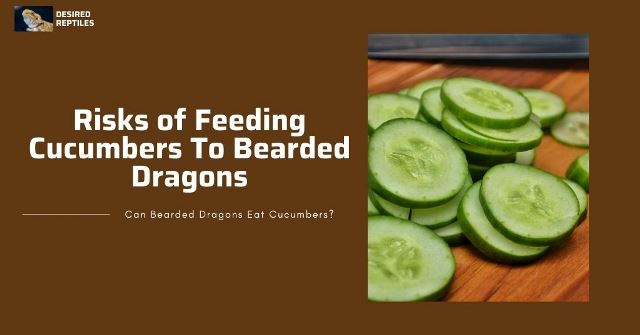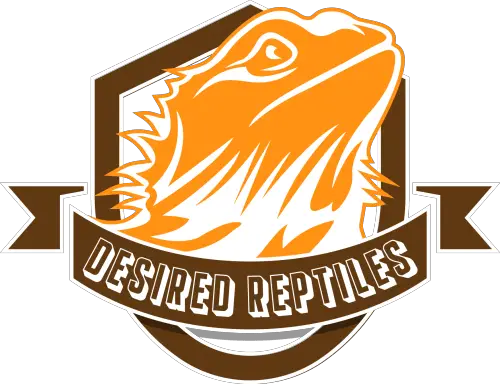Several aspects come into play when you’re deciding whether or not a plant is safe for your dragon to consume. You must understand what value the plant will add to your pet’s health and what you may be risking in the process. These plants are placed on somewhat of a spectrum; on one end we have the safe veggies that beardies eat daily like collard greens, dandelion greens, and butternut squash, and on the opposite end, the occasional plants like okra, kale, cucumbers, and cabbages. It’s important to acknowledge what your pet eats so that you understand how to regulate them and keep your beardie safe.
Bearded dragons can eat cucumbers, but they must be eaten every other week! Cucumbers are high-water and low-nutrition veggies that are not entirely the best for beardies, especially the younger ones. Feeding your bearded dragon too many cucumbers can and will cause it to fall sick along the line.
Before you feed your beardie cucumbers, you need to take into consideration the overall health of your beardie and what happens when rarely-fed veggies are included in their diet. Let’s go!
Should I Feed My Bearded Dragon Cucumbers?
There are very distinct reasons why bearded dragons should eat cucumbers, and it’s mainly for hydration. Because they contain 95% water, it would be an easy way to get moisture into your dragon’s system or help to relieve constipation. It is also the reason why cucumbers are rare treats; the water content is way too high for dragons to process and could cause them to have diarrhea especially if the beardies are recovering from an illness.
In other cases, cucumbers are fed to dragons that are dehydrated in place of the water-soaking method. Especially since cucumbers are high in fiber which may be useful in this specific situation.
So, whether or not you should feed your beardie cucumbers may depend on its health condition and just how much your dragon enjoys cucumbers.
Before we get into the benefits, let’s consider the nutritional value of 1 cup of cucumber according to the USDA:
- Calories: 16
- Total fat: 0.2 grams
- Sodium: 2 milligrams
- Total carbohydrates: 3.2 grams
- Dietary fiber: 1 gram
- Total sugars: 1.8 grams
- Protein: 0.8 grams
- Vitamin C: 4.5 milligrams
- Vitamin K: 10.2 micrograms
- Magnesium: 13.2 milligrams
- Potassium: 152 milligrams
- Calcium: 19 milligrams
- Phosphorus: 24 milligrams

5 Fantastic Ways Cucumbers Are Great For Bearded Dragons
Cucumbers may be water-filled veggies, but they still contain nutrients that your pet can utilize. Here are the benefits of feeding cucumbers to your beardie:
1. A Means Of Hydration
Cucumbers are highly saturated with water which can be beneficial when eaten in moderation. As you know, beardies are not water-loving animals. They need very little percentages of water to survive as they do in the wild. Instead of making them healthier, water taken in excess can cause your pet to fall sick. Nevertheless, feeding cucumber to your beardie is one way of keeping it hydrated. This leads to better circulation, digestion, and excretion through its system.
2. Cucumbers Are Great For Detoxification
Cucumbers are particularly helpful to the liver which is the major detoxifying organ. They are saturated with electrolytes, antioxidants, and anti-inflammatory agents that assist the liver to break down and excrete toxins from your beardie’s body. The kidney also plays a role in detoxification mainly through the use of water. Cucumbers aid your beardie’s kidneys to break down urates appropriately eliminating or reducing the possibility of kidney stones or urate plugs.
3. Cucumbers Are Rich In Fiber
Fiber is highly useful for the digestive system and cucumbers are loaded with fiber. They provide your beardie with the bulk load needed to speed up digestion and prevent bloating or constipation. It improves and regulates the poop consistency of beardies making excretion an easy process. It also improves your bearded dragon’s gut health by providing good gut bacteria with the tools to multiply, enrich the gut lining, and metabolize ingested food properly.
4. Cucumbers Can Regulate Blood Pressure
Cucumbers are high in potassium which is essential for regulating blood pressure. Potassium helps in relaxing the blood vessels to allow better blood flow, especially if your pet is overweight. The vegetable also contains ligands that work together with potassium to improve the health of the blood vessels. In essence, your dragon will have a healthier heart and better blood circulation by eating cucumbers (correctly of course) now and then.
5. Cucumbers Are Rich In Antioxidants
Antioxidants are organic chemicals that regulate and improve cellular metabolism. They’re like a micro-police that regulates the number of free radicals in the body. These notorious free radicals disrupt the proper bonding between molecules by stealing electrons and bonding to them instead. This of course may seem minor, but it leads to a domino effect that can cause the cells to grow out of proportion into tumors and cancers. The more antioxidants your pet consumes, the safer it is from developing cancer.
How To Feed Your Bearded Dragon Cucumber – The Safest Way Possible
Bearded dragons can eat cucumbers and they pack quite a handful of benefits for your pet, too. However, it’s important to know how to prepare this vegetable, so that you don’t expose your pet to danger.
You must first wash the cucumbers properly to get any chemicals off of them. It’s common for plants to be doused in herbicides and pesticides before they reach the consumer market, so it’s always a good idea to wash them clean before consumption. If you have a small vegetable garden with chemical-free cucumbers, even better for your beardie!
Now, beardies cannot eat every part of the cucumber, particularly the skin and seeds. These parts are a little difficult to digest, and since bearded dragons do not have the teeth to crush and grind, they could easily get impacted by them. You must peel the cucumber and take out the seeds first. You’d be left with the flesh, which is the part your beardie can eat safely. You can then dice the cucumber into smaller sizes for your dragon to eat comfortably.
After preparing the cucumber – peeling, gutting, and chopping – you have to take note of the rations. Cucumber is considered a rare treat for your beardie and should be only 10% of your pet’s entire salad. It’s a little difficult to determine how many slices of cucumber your beardie should eat since factors like the size of the cucumber and the age of your dragon come into play.
What you can do instead is size up your beardie’s daily salad whatever the quantity depending on the age of your pet, and imagine what 10% of the salad would be. That quantity is the amount of cucumber that your dragon can eat safely.

Dangers Of Feeding Cucumber To Your Bearded Dragon
Cucumbers can cause your dragon to fall terribly sick if it eats too many of them. This would mean your beardie is eating way too much at once, or too frequently than it’s supposed to. It’s very important to adhere to the quantity and frequency you feed your dragon cucumbers so that you prevent them from suffering from the following:
Potassium Poisoning
Remember that a complete beardie salad contains all the minerals and vitamins your pet needs to stay healthy. Sometimes, treats can contain a comparable amount of a specific mineral or group of minerals to the main meals that will lead to an overdose if the treat is fed frequently. Cucumbers are rich in potassium which is good for the heart and circulatory system. Although, in excess, it could lower blood pressure and lead to heart failure depending on the severity of the issue. This condition is termed hyperkalemia.
Metabolic Bone Disease
Metabolic bone disease is a common crisis that plagues bearded dragons in captivity. The disease is easy to contract and avoid, so preventive measures must be carried out at all times. Cucumbers have an unfriendly ratio of calcium and phosphorus (1:2) which puts your dragon at a loss of calcium. This is because phosphorus is a calcium-binding mineral, and if greater than calcium, will cause a shortage (of calcium) directly leading to MBD.
Diarrhea And Dehydration
Excessive water intake is bad for bearded dragons, and feeding them too many cucumbers yields the same outcome; diarrhea and dehydration. Beardies drink water every other day because their body naturally makes do with the moisture in the plants they eat. The little amount of water they consume is just enough for them to stay healthy.
Feeding your dragon too many cucumbers will cause severe stomach problems, diarrhea, dehydration, and malnutrition. This is because the excessive water intake literally washes away the food your dragon digests without any proper absorption, and so even if your dragon eats healthy meals, it’s not able to use up the nutrients since everything leaves so quickly. Your dragon could get really sick from this problem, even fatally ill, especially if your pet is still young or recovering from a prior illness.
Much Better Alternatives To Cucumbers
It’s safe to feed your beardie cucumbers as long as it’s done the right way, but some treats are safer and contain better nutritional value to cucumbers and would frankly taste more savory to your beardie.
- Kale
- Bell peppers
- Sweet potatoes
- Yams
- Carrots
- Green beans
- Parsley
- Prickly pear
Plants You Should Certainly Not Feed To Your Beardie
There are several plants beardies cannot and should not be eating. Whatever happens, beardies must avoid these plants:
- Mushrooms
- Ivy
- Rhubarb leaves
- Chrysanthemums
- Holly
- Tomato leaves
- Daffodils
- Cyclamen
- Avocados
